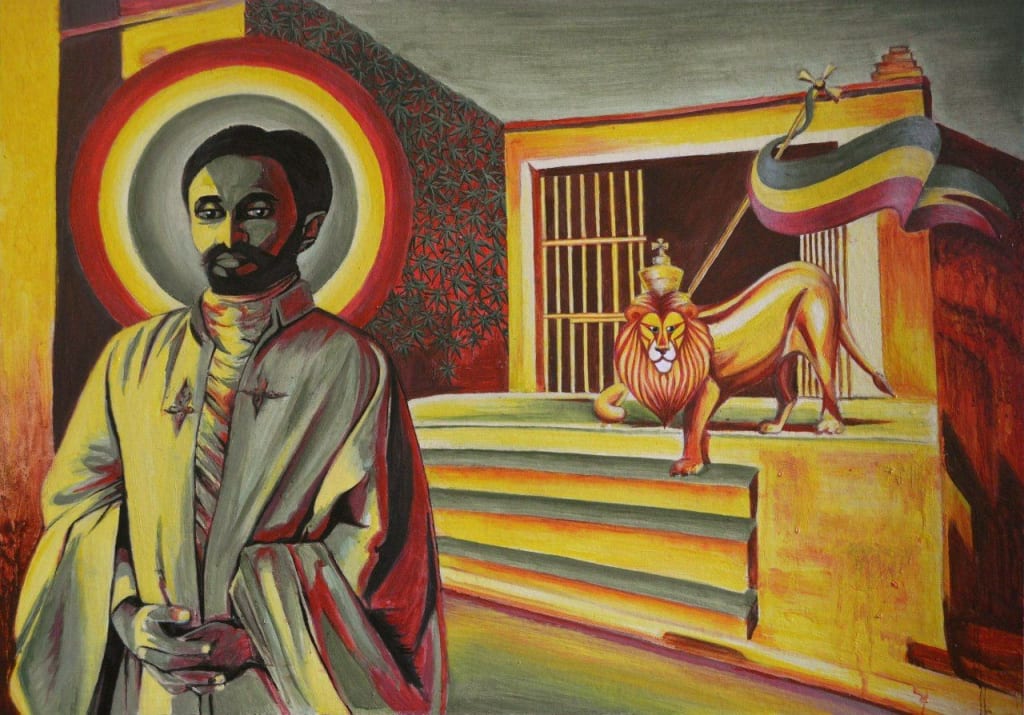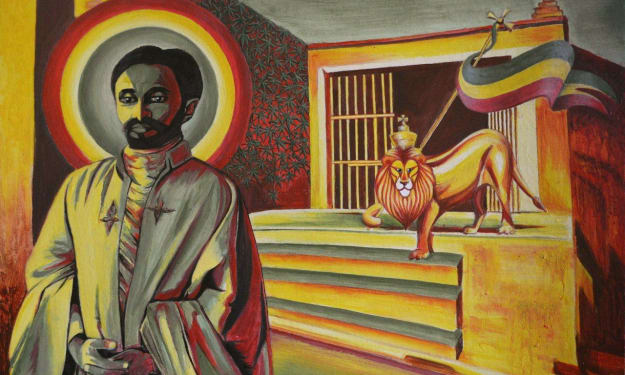
Music has long been recognized as a powerful medium that transcends cultural boundaries and touches the depths of our souls. It possesses the remarkable ability to evoke emotions, uplift spirits, and create a sense of unity among individuals. Beyond its captivating melodies and rhythms, music holds a profound connection to spirituality, acting as a conduit for the divine and a means of deepening our spiritual experiences.
At the heart of this intersection between music and spirituality stands a figure who has become synonymous with both: Jah. Jah represents more than just a name or an entity; it is a symbol of the harmonious bond between music and the spiritual realm. Often associated with the Rastafarian movement, Jah encapsulates the essence of divine inspiration and serves as a bridge that unites people across different cultures, beliefs, and backgrounds.
Emerging from the reggae music scene, Jah's influence extends far beyond the genre itself. Through his music, Jah conveys profound messages of love, peace, unity, and social justice, resonating with listeners on a spiritual level. Whether you are a devout follower of Rastafarianism or simply an appreciator of uplifting and conscious music, exploring the connection between who is Jah, music, and spirituality offers a unique journey of self-discovery and enlightenment.
In this blog post, we will delve deeper into the remarkable relationship between music and spirituality, with Jah as our guiding force. We will explore the power of music in spiritual practices, examine the lyrics and messages embedded in Jah's music, and delve into the influence of his music on spiritual movements. By the end, we hope to inspire you to embark on your own exploration of Jah's music as a means of bridging the gap between the earthly and the divine, and discovering the transformative power of this sacred connection.
The Power of Music in Spiritual Practices
Since ancient times, music has played a vital role in religious and spiritual rituals across various cultures. It has been an integral part of ceremonies, rites of passage, and worship practices. From the mesmerizing chants of Tibetan monks to the soul-stirring hymns of Christian churches, music has served as a vehicle to establish a connection with the divine.
In ancient civilizations such as Egypt, Mesopotamia, and Greece, music was considered a sacred art form closely intertwined with spirituality. It was believed to possess the power to communicate with gods, invoke spiritual energies, and facilitate transcendental experiences. The mystical sounds of instruments and the harmonious blending of voices created an atmosphere conducive to prayer, meditation, and communion with higher realms.
How music acts as a medium for connecting with higher realms and expressing emotions
Music has a remarkable ability to transcend language and directly touch the depths of our emotions and souls. It has the power to evoke feelings of joy, sorrow, awe, and transcendence. In spiritual practices, music serves as a medium for individuals to connect with higher realms, access altered states of consciousness, and experience a sense of unity with the divine and fellow worshippers.
The rhythmic patterns, melodic structures, and harmonies in music can create a sonic landscape that resonates with our innermost being. It can uplift our spirits, quiet our minds, and open our hearts to deeper spiritual experiences. Through melodic and lyrical expression, music becomes a channel for the communication of prayers, devotion, and the expression of profound spiritual truths.
Examples of musical traditions in different spiritual practices
Across the globe, diverse spiritual practices have embraced music as an integral part of their rituals and ceremonies. These traditions have developed unique musical styles, instruments, and vocal techniques that amplify the spiritual experience. For instance:
In Hinduism, sacred chants called mantras are recited or sung to invoke deities and cultivate a state of spiritual awareness. The use of instruments such as the sitar, tabla, and tambura adds depth and texture to these devotional practices.
Sufi Islam incorporates music as a vehicle for spiritual union with the divine. Through ecstatic rhythmic movements and the enchanting melodies of instruments like the ney flute and the daf drum, Sufi music aims to induce a trance-like state and facilitate a direct experience of divine love.
Native American tribes utilize music and ceremonial songs to connect with nature, honor ancestors, and seek spiritual guidance. Instruments like drums, flutes, and rattles are used to create a rhythmic heartbeat that harmonizes with the natural world and invokes spiritual energies.
These are just a few examples of the rich musical traditions within different spiritual practices. Each tradition infuses its music with unique spiritual symbolism, cultural context, and a deep understanding of the transformative power of sound.
Jah: The Symbol of Music and Spirituality
Jah, often referred to as "Jah Rastafari," is a name that holds significant cultural and spiritual importance, particularly within the context of Rastafarianism. The roots of who is Jah can be traced back to the Ethiopian Amharic language, where it is derived from the biblical name Yahweh or Jehovah, used to refer to the one true God. The Rastafarian movement, which emerged in Jamaica in the early 20th century, adopted the name Jah as a central symbol of their faith and belief system.
Within Rastafarianism, Jah is seen as the embodiment of divinity, the supreme being who transcends all earthly limitations. Rastafarians view Jah as the living God, the source of all life and creation, and the ultimate guide and protector. This spiritual concept of Jah goes beyond religious dogma and represents a deeply personal and profound connection with the divine.
The association between Jah and Rastafarianism
Rastafarianism, a socio-religious movement rooted in Jamaica's history and African diaspora, embraces Jah as a central figure and source of inspiration. Rastafarians believe that Emperor Haile Selassie I of Ethiopia, crowned in 1930, is the earthly incarnation of Jah. They see him as a messianic figure, fulfilling the prophecy of the return of the Black Messiah, as foretold in the Bible.
The association between Jah and Haile Selassie I represents a powerful spiritual and political message within Rastafarianism. It signifies the empowerment and liberation of African people from the oppression of colonialism, racism, and social injustice. The belief in the divinity of Haile Selassie I and the connection to Jah has been a driving force in the Rastafarian movement, shaping its cultural practices, values, and music.
Jah's role as a unifying force in the rasta music genre
Rasta music, with its roots firmly grounded in Jamaica, has become synonymous with Jah and the Rastafarian movement. Reggae emerged as a powerful vehicle for expressing the experiences, struggles, and aspirations of the marginalized communities in Jamaica, especially the Rastafarians. It provided a platform for social commentary, spiritual reflection, and cultural identity.
Through rasta music, artists like Bob Marley, Peter Tosh, and Burning Spear brought Jah's message of love, peace, unity, and social justice to a global audience. The lyrics and rhythms of reggae became a unifying force, transcending geographic boundaries and resonating with people from all walks of life. Jah's influence on the reggae genre can be felt in the conscious lyrics that uplift spirits, inspire change, and promote a sense of unity among listeners.
Jah's presence in rasta music extends beyond the religious or spiritual domain. It represents a broader philosophy of embracing compassion, empathy, and the pursuit of a more equitable world. The music of Jah and reggae as a whole continue to serve as a unifying force, reminding us of our shared humanity and the power of music to bring people together.
Lyrics and Messages in Jah's Music
Jah's music carries profound messages that resonate with listeners on a spiritual level. By analyzing the lyrics of popular Jah-inspired songs, we can gain insight into the depth and significance of the messages conveyed. Songs such as Bob Marley's "One Love," Peter Tosh's "Equal Rights," and Burning Spear's "Slavery Days" exemplify the lyrical power of Jah's music.
These songs often employ poetic imagery, metaphor, and storytelling to convey universal themes of love, freedom, and social consciousness. Through their lyrics, Jah's music explores the complexities of human existence and the quest for spiritual enlightenment. By diving into the rich lyrical content of these songs, we can uncover deeper layers of meaning and the transformative potential of Jah's music.
The recurring themes of love, peace, unity, and social justice in the music
Love, peace, unity, and social justice are recurring themes that permeate Jah's music. The lyrics emphasize the power of love as a unifying force that transcends divisions and fosters harmony among individuals. They advocate for peaceful resolutions to conflicts and advocate for the eradication of social injustices, such as racism, poverty, and oppression.
Jah's music encourages listeners to embrace unity, recognizing that we are all interconnected and part of a larger human family. The songs call for solidarity, respect, and empathy, emphasizing the importance of compassion and understanding in creating a better world. Through their messages of love, peace, and unity, Jah's music inspires listeners to introspect, awaken their social consciousness, and actively work towards positive change.
Spiritual teachings embedded in Jah's music
Jah's music is infused with spiritual teachings that go beyond religious boundaries. The lyrics convey profound wisdom and spiritual insights, encouraging listeners to cultivate inner peace, seek spiritual enlightenment, and connect with the divine. They remind us of the impermanence of material possessions and the importance of cultivating a spiritual connection that transcends worldly attachments.
Jah's music often draws inspiration from Rastafarian principles, incorporating spiritual concepts such as faith, righteousness, and the pursuit of truth. The songs speak to the inherent divinity within each individual and the potential for spiritual growth and transformation. They encourage listeners to seek higher consciousness, embrace self-discovery, and align their actions with principles of love, justice, and compassion.
Through their spiritual teachings, Jah's music serves as a guiding light, offering solace, inspiration, and guidance in navigating the challenges of life. It prompts reflection, provokes introspection, and invites listeners to embark on their own spiritual journey.
The Influence of Jah's Music on Spiritual Movements
Jah's music has had a profound impact on Rastafarianism, serving as a powerful vehicle for expressing and reinforcing the core beliefs and values of the movement. Rastafarianism emerged as a response to social and political injustices faced by marginalized communities in Jamaica, particularly those of African descent. Jah's music became a voice for the voiceless, resonating with the experiences, struggles, and aspirations of Rastafarians.
Through his music, Jah helped to shape and define the Rastafarian identity, empowering its followers with a sense of pride and cultural heritage. The lyrics and messages in Jah's music reinforced Rastafarian principles of self-determination, African consciousness, and resistance against oppression. They became anthems of hope and inspiration for Rastafarians, providing solace and a sense of belonging within a society that often marginalized them.
How Jah's music has resonated with individuals seeking spiritual enlightenment
Jah's music has transcended cultural and religious boundaries, resonating with individuals from diverse backgrounds who seek spiritual enlightenment and a deeper connection with the divine. The universal themes of love, peace, and unity in Jah's music touch the hearts and souls of listeners worldwide, regardless of their religious affiliations.
Many individuals find solace and inspiration in the spiritual teachings embedded in Jah's music. The lyrics provide a guiding light, encouraging introspection, self-reflection, and a pursuit of inner peace. Jah's music serves as a catalyst for personal transformation, inviting individuals to question societal norms, embrace spirituality, and explore their own paths to enlightenment.
The global reach of Jah's music and its influence on diverse spiritual communities
The global reach of Jah's music extends far beyond the boundaries of Rastafarianism. Reggae music, inspired by Jah's messages, has become a global phenomenon, transcending cultural and linguistic barriers. Jah's music has influenced and inspired diverse spiritual communities around the world, fostering a sense of unity, cultural exchange, and shared values.
In various spiritual communities, Jah's music serves as a source of inspiration, offering a platform for expression and connection. Whether it is through reggae-inspired devotional chants, conscious music festivals, or spiritual gatherings, Jah's music acts as a unifying force that brings people together, regardless of their specific spiritual beliefs.
The influence of Jah's music can be seen in the incorporation of reggae rhythms, lyrical themes, and spiritual teachings into the practices of different spiritual communities. It has become a medium through which individuals express their spiritual devotion, seek higher truths, and find a sense of belonging within a broader global community.
Conclusion
Throughout history, the interconnection between music and spirituality has been undeniable. Music has served as a powerful medium for expressing emotions, connecting with higher realms, and fostering a sense of unity and transcendence. It has the ability to evoke profound spiritual experiences, uplift the soul, and provide solace in times of struggle. The universal language of music transcends cultural, religious, and linguistic barriers, allowing individuals to connect on a spiritual level beyond words.
Jah, as a symbol of music and spirituality, plays a significant role in bridging the gap between these two realms. His music carries messages of love, peace, unity, and social justice, resonating with individuals seeking spiritual enlightenment and a deeper connection with the divine. Jah's music has influenced not only the Rastafarian movement but also diverse spiritual communities worldwide, inspiring listeners to embrace their own spiritual journeys and work towards a more harmonious world.
As we conclude this exploration of who is Jah and his profound impact on music and spirituality, it is important to encourage readers to engage with his music as a pathway to spiritual enlightenment and understanding. Listening to Jah's music with an open heart and mind allows for a deep connection with the messages and teachings embedded within the lyrics. It invites listeners to reflect on their own spiritual journey, question societal norms, and align their actions with principles of love, justice, and compassion.
By immersing themselves in Jah's music, readers have the opportunity to experience the transformative power of music and tap into their own spiritual potential. Whether through reggae or other genres influenced by Jah's messages, exploring his music can be a catalyst for personal growth, social consciousness, and a deeper connection with the divine.
Let us embrace the unifying force of Jah's music, recognizing its ability to transcend boundaries and inspire individuals to seek higher spiritual truths. As we continue on our own spiritual journeys, may we find solace, guidance, and inspiration in the timeless melodies and powerful messages of Jah's music, knowing that music has the power to uplift, transform, and connect us all as spiritual beings on this extraordinary journey of life.
Final Note
If you’re interested in learning who is Jah and exploring Rastafarian recipes, we invite you to check out Fifth Degree and our collection of Jamaican clothing. We believe that what you wear can be a powerful expression of your values and beliefs, and we’re proud to offer a range of high-quality, stylish, and socially conscious reggae colors clothing for individuals who are seeking to live in harmony with nature and the divine. Visit our website today to learn more about Buju Banton, best part of Jamaica to vacation, mens joggers sale, rasta sweater, sloth slippers, hippie yoga pants, rasta dress and find the perfect Rastafarian clothes for woman for you.






Comments
There are no comments for this story
Be the first to respond and start the conversation.